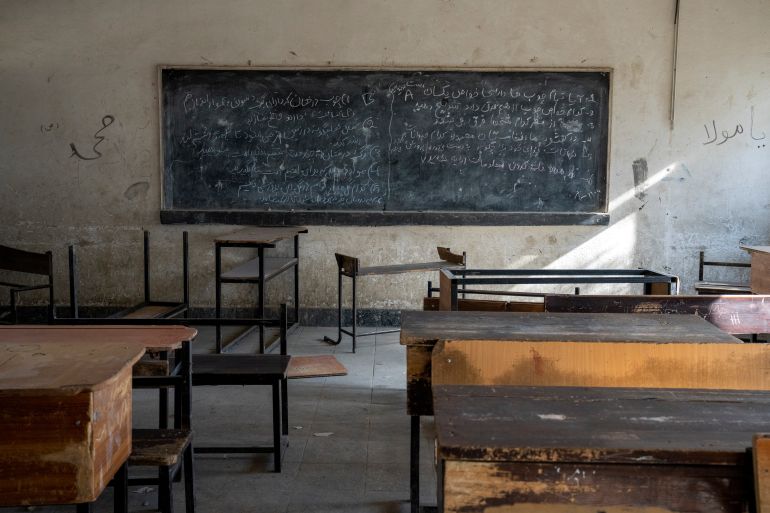Taliban ban on girls’ education defies both worldly and religious logic
The ban stands against the core principles of Islam and hinders Taliban’s efforts to gain international recognition.

Spring has arrived in Afghanistan, and Afghan children have returned to their schools to begin a new academic year. Girls beyond the 6th grade across much of the country, however, are still unable to pursue an education and remain unsure what the future holds for them.
Two years ago, on a spring day like today, the hopes and dreams of Afghan schoolgirls were crushed by the Taliban’s interim government. On March 21, 2022, the Taliban promised to reopen all schools in Afghanistan, seemingly ending the temporary ban it had placed on girls attending secondary school since its return to power seven months earlier.Two days later, while many girls were enthusiastically preparing to return to school, the authorities reversed the decision and restricted girls over the age of 12 from attending state-run schools. In an apparent attempt to soften the blow, the Ministry of Education said the closure would be temporary and schools would be reopened once it put in place policies that would ensure compliance with “principles of Islamic law and Afghan culture”. Six months later, with no plan in place to reopen secondary schools to girls in the foreseeable future, the government issued a new edict and banned girls and young women in Afghanistan from higher education.
This move prompted countless analysts and experts around the world, including myself, to invite Taliban leaders to rethink their decision. We pointed out that “depriving Afghan women of an education would benefit no one” and these anti-education edicts actually stand against the very foundations of Islam.
Regrettably, the Taliban did not listen. This March, exactly two years after the supposedly temporary ban on girls attending secondary schools and universities, another academic year in Afghanistan began without the presence of women and girls.
The hopes and dreams of teenage girls, who believed the ban on their education was indeed “temporary” and they would return to their classrooms once the conditions were “right”, have likely begun to fade away. These girls and their families trusted the word of the new Taliban leaders, and as we can confidently say after two years with no progress in returning them to their schools, they were let down.
As we enter the last week of Ramadan, it is a good moment to reflect on the importance of not reneging on a promise. Those leaders who claim to execute the Divine Will have the responsibility of fulfilling the promise made to millions of innocent Afghan schoolgirls who find themselves oppressed and deprived of their God-given right to an education.
The Taliban’s stance on this issue defies both worldly and religious logic. Afghanistan, a post-conflict nation that has just emerged from the jaws of multiple protracted armed conflicts spanning four decades, needs all hands on deck to work towards getting the country out of the economic abyss that it finds itself in. The Taliban takeover of Kabul in 2021 and the ensuing uncertainty precipitated the exodus of a vast number of Afghan professionals, leading to a brain drain at a very precarious time. The last thing that the nation needed was its new leaders to handicap it further and jettison any prospects of recovery by excluding half the population from participating in education, and thus the recovery efforts.
The exclusion of girls from education also contradicts the Taliban’s aim to build a gender-segregated society. How can women have dedicated healthcare when no female healthcare workers are trained in the country? According to the World Health Organization, 24 women died each day in Afghanistan from pregnancy or childbirth-related causes in 2020 – one of the highest rates in the entire world. While this statistic was a significant improvement from the situation in 2001 when the Taliban was last in power, experts fear that the situation is likely to get worse, and the Taliban’s diktats on curtailing women’s education in schools and universities are not helping either.
From the religious perspective, too, the Taliban leaders must realise that they are accountable before Allah SWT for thrusting ignorance upon a generation of girls just so they can claim a perceived localised victory of tradition. When the Taliban ruled Afghanistan in their previous avatar from 1996 to 2001, the education of women was banned across the nation as were most of the avenues for their employment. This time, the Taliban gave public assurances that it would do things differently and avoid earlier pitfalls and mistakes. The people of Afghanistan believed it. They put their trust in the Taliban. This trust, this “Amanah”, is an asset the Taliban should value and not waste away in pursuit of meaningless political gains.The group that claims to follow the path of Prophet Muhammad (SAW), the Amin, the trustworthy, should not be seen to break the Amanah of the people.
The Taliban’s refusal to allow Afghan women and girls to receive an education is also a strategic mistake that stands in the way of the government’s efforts to gain international acceptance and find reliable partners that would support Afghanistan’s economic and structural development. The important geostrategic location of Afghanistan has led to it receiving a lot of political attention from major global and regional powers for much of its history. Oftentimes, this translated into protracted conflict and resulted in security issues overshadowing all global discussions and engagement with Afghanistan. If it is serious about bringing stability to and building a prosperous future for the country, the Taliban must endeavour to expand the global interest in Afghanistan beyond security and divert the agenda of global engagement with the country to issues of development. Such a change would not only create the conditions for international projects and initiatives that would create employment and alleviate the suffering of millions of Afghans living in dire conditions but would also help end the international isolation of Afghanistan and pave the way for its integration into the rest of the world.
By allowing another academic year to pass without resolving the issue, the Interim Government in Kabul is demonstrating a worrying lack of capacity to work out what should have been a straightforward mechanism to create the conditions under which girls would be allowed back to school. Thus, it is signalling to the international community, including the Muslim World, that it cannot be trusted and is practically putting a block on any development-focused engagement that could put an end to its ongoing isolation. Any further procrastination on the issue will no doubt reflect negatively locally, regionally, and globally on the Taliban and on their efforts to demonstrate the applicability of political Islam to today’s development challenges.
It is high time for the Taliban to undo this egregious mistake and prove to its own people and the rest of the world that it is a trustworthy leader, and a responsible caretaker of the future mothers and daughters of its nation.
-al jazeera







